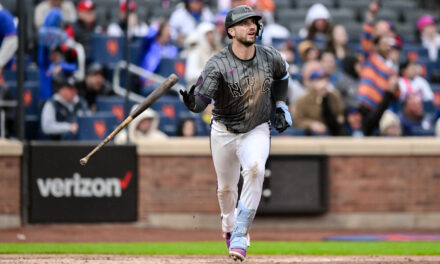You know I took some heat recently for writing the blog regarding Wright’s supposed un-clutch ability here. Before I get into the subject of this blog, let me explain that.
The problem I have with the so-called clutch players and the so-called un-clutch players is it’s usually based on memory and not fact. For example, one could argue that in the 2001 World Series Luis Gonzalez had a clutch series winning base hit against Mariano Rivera. Does anybody argue that Rivera’s “clutch” ability was hindered by that occurrence? Sometimes a pitcher beats you, and sometimes a hitter beats you. Eckstein beat K-Rod recently, but that was mostly because K-Rod left a meatball over the plate, not because Eckstein rose to the occasion. Eckstein’s a professional hitter, you leave a ball over the plate and he will hit it whether it’s the 1st or 9th inning.
The problem I have with the so-called clutch moment is it’s in the eye of the beholder. During a chat on MMO recently, somebody (forgive me I forgot who) mentioned to me that Rod Barajas was more clutch than David Wright, simply because of the 3 Game winning HR’s Barajas hit earlier this season.
To me that’s hogwash. You remember those at bats, but you don’t remember the other 141 times that Barajas has made outs this year. Were none of those at bats important to the Mets 2010 success? A clutch at bat is a single moment that for some over shadows an entire season of failure.
When we place so much value on the idea of a “clutch” hit, we tend to forget that innings 1-7 count in the box score also. Give him credit; Barajas had 3 game winning homeruns which were amazing moments. However, how many games has David Wright put the Mets over the top in earlier innings compared to Rod’s 3 moments? Yet, those who preach about clutch hitting would say Barajas is a better clutch hitter.
I don’t subscribe to the clutch hitting theory because I believe every at bat can have an impact on the final score. I believe that if a hitter comes through in the 2nd inning with runners in scoring position, it could lead to the same impact if a hitter succeeds in the 9th inning. Is a hitter running out of time in the 9th inning? Absolutely, but there are so many factors that can go into whether a hitter succeeds at the plate no matter what the situation is.
Those who declare that David Wright is not a clutch hitter in my opinion are simply ignoring the entire body of work and focusing on specific moments they remember.
Whether some like to admit it or not, baseball is a game of numbers. Managers bring in relievers because their numbers dictate they can get lefties out better than the guy on the mound can, batting orders are based on numbers, those who get on base more are slotted at the top of the lineup. Nobody can deny that human beings have the ability to occasionally rise above their talent, but for me I look at a larger sample size than the occasional “game last night” moment.
Here are some numbers for you. For this exercise I took only Hits, AB, and RBI. Because again, many of those who subscribe to the idea of clutch, do not believe a walk is a clutch at bat. To me, a clutch at bat can happen with runners on base, runners in scoring position, the bases loaded or runners in scoring position with 2 outs. A situation like this in the 2nd inning of a game can be as important as a situation like this in the 9th inning. Why? Because if you come through with the bases loaded in the 2nd inning, it’s very possible the 9th inning won’t matter.
So let’s take a look at some numbers since 2005.
With Runners on Base, you have the option of two hitters
Player A: Gets a hit 31.2% of the time, and drives in 1.07 runs per hit in this situation.
Player B: Gets a hit 31.4% of the time, and drives in 0.83 runs per hit in this situation.
Who do you choose in this situation? Take a sticky note, and jot down your choice.
With Runners in Scoring Position:
Player A: Gets a hit 30.5% of the time, and drives in 1.49 runs per hit in this situation.
Player B: Gets a hit 31.2% of the time, and drives in 1.35 runs per hit in this situation.
Who do you choose in this situation? Take a sticky note, and jot down your choice.
With Bases Loaded:
Player A: Gets a hit 33% of the time, and drives in 2.77 runs per hit in this situation.
Player B: Gets a hit 35% of the time, and drives in 2.78 runs per hit in this situation.
Who do you choose in this situation? Take a sticky note, and jot down your choice.
With Runners in Scoring Position & 2 out:
Player A: Gets a hit 25.4% of the time, and drives in 1.38 runs per hit in this situation.
Player B: Gets a hit 32.2% of the time, and drives in 1.29 runs per hit in this situation.
Who do you choose in this situation? Take a sticky note, and jot down your choice.
Conclusion?
What these numbers tell me is that with runners on, or with runners in scoring position and 0 or 1 out, Player A appears to be the better option. They appear to get a hit just as often, but it also looks clear that they drive the ball far enough to allow more runners to score.
With the bases loaded and runners in scoring position and 2 outs, I’d have to go with Player B. The bases loaded numbers are almost identical, but I have a 2% greater chance to get a hit with Player B. The fact the RBI totals are practically identical tells me that Player A seems to have more power when he hits the ball.
In terms of scoring position & 2 outs, this is certainly in Player B’s favor. The consolation for Player A is that when he does hit the ball safely, more runs come in than when Player B does so.
The Reveal
Player A is David Wright, and Player B is the “most clutch” hitter of this era in Derek Jeter.
Now, I know some cynics may say Jeter’s role is not to drive in runs. Go tell him that. He didn’t become known as the most clutch hitter of this generation by getting a single and allowing others to drive him in. In the American League, everybody’s job is to be a run producer. Also, clearly part of his clutch ability stems from his performance in the post-season. To me, there are 162 games to be played before you can get to the post-season. If you’re only clutch in October, then you leave your team out to dry for 6 months. Comparing Jeter’s post-season to Wright’s would be silly. There is not enough data for anybody to prove one way or the other if Wright is “clutch” based on his post-season performances.
Does this prove Wright is as clutch as Jeter? No, and that was not my intention. My intention was to show you that just because you remember Wright doesn’t get a hit 70% of the time with runners in scoring position, doesn’t mean you should forget the 30.5% when he does get a hit. After all, Mr. Clutch himself is only getting a hit in that situation 0.7% of the time more than Wright. With runners in scoring position, Wright has 900 AB’s since 2005; those who declare him un-clutch could not possibly remember all of them.
Clearly where Wright needs to improve is when there are runners in scoring position and 2 out. If somebody is going to tell me that is the only thing that matters when it comes to determining “clutch” ability, then I’d argue that’s choosing data to prove your point, and not looking at the entire picture.
Either way, the debate will always continue. This is why I question the validity of clutch ability, because when push comes to shove, it’s what you choose to remember, and not everything that has happened.













